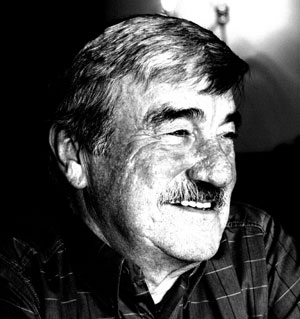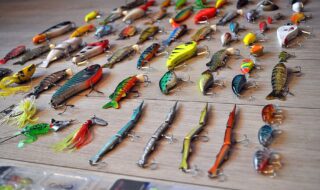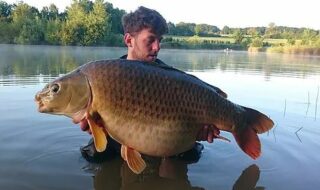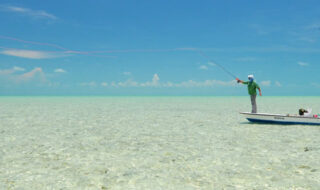The man who led England to its first every gold medal talks about world championships set-ups past and present as he shares a pint and a pie with tcf’s editor, Gareth Purnell.
Name Dick Clegg
Age 68
Occupation International events manager for the NFA
Hometown Barnsley, South Yorks
Angling ambitions I’d like to see the NFA become a really strong working unit for angling because we need something. I’d also really like to see the veterans competition become very successful at world level.
Greatest angling achievements Winning the UK Champs and the Embassy when there were 20,000 entries stand out on the individual front. Barnsley won almost everything when I was captain, although it was a regret that we never won the Division One National. And, of course, winning England’s first ever gold in Italy and claiming gold in England.
GP: A little birdie tells me that you and Britannia Angling Products are soon no longer to be?
DC: I’m 69 now. In fact I should have retired a few years ago really but I still enjoy going to work. My wife who was doing the book keeping had had enough and Tony Peel was on board and doing okay so we came to an agreement that he would buy Britannia from me. He’s been with us four years and he doesn’t know everything, especially on production, so I’m being retained as a consultant which sounds grand but probably isn’t! Most of the manufacturing has gone abroad. We still make floats but I used to have eight people making luggage. Now there’s only one.
GP: So what’s Dick Clegg going to do with his retirement?
DC: I’m already fishing twice a week and golfing twice a week. I go to Hallcroft regularly for over-50s events and they get over 35 anglers in midweek, which is good. I’m also fishing in the Sunday opens and I’m doing alright. I’m fishing more now than for a long time. I’m looking forward to going when I want to go and not when work allows.
GP: What do you think of commercials?
DC: I only like them because they are convenient. I’ve tended to concentrate on one venue – you need to do this to be in contention. But you see the same faces. There are obviously some who have adapted better to commercials than others – the likes of Don Slaymaker and Kenny Giles. There aren’t that many teenagers and anglers in their early 20s. The biggest problem is that there are too many match venues, so there are too many 20-peggers. When I started the matches were 600-peggers.
GP: Is it true you were one of the first specialist anglers?
DC: I started fishing when I was eight or nine years old with my father. He wasn’t a regular but he would take me. I fished a few matches but after meeting up with a few guys from Sheffield we formed the Northern Specimen Hunters Group and I’d write articles for the Green ’Un, which was the Sheffield Saturday sports paper. I specialised in barbel fishing in Yorkshire waters. I was one of the founder members of the National Association of Specimen Groups, which was the forerunner to the National Association of Specialist Anglers that’s still thrives today.
GP: Tell me how you got into the angling trade?
DC: I was an engineer at the time in Sheffield for a company making industrial furnaces and along came an opportunity to buy an angling shop in Huddersfield, which is a 22 mile trip from Barnsley. It was pretty foolish of me. My wife ran it with my father and she had to catch a bus that took an hour and half each way every day. With two kids to look after it was very difficult for her! Then another chance came up to buy a small shop in Sheffield. I left work and ran Clegg Brothers Tackle Shop with my brother. That got us back into match fishing because the customers were pretty much all match anglers – I was nearly 30 by then. Suddenly we were totally match-oriented and fishing the big Witham and Welland events. Those were the days when we’d buy two tons of groundbait on a Thursday, stay up until midnight bagging it and sell it all over the weekend along with 60 gallons of squatts. Not long later I sold the Huddersfield shop and opened another one in Barnsley, and soon enough I was fishing for Barnsley and ended upon the committee.
GP: Where does Britannia Angling Products come into it all?
DC: My brother bought the Barnsley shop from me because at the time we’d started wholesaling fishing tackle, which I was doing from home. I had a call from Gerry Woodcock who had folded a float making business, and he offered the stock and the machinery for sale. I went into business with him and Geoff Steel in Nottingham next to the Notts County football ground. But it never worked out between Geoff and Gerry, and I had to buy Geoff out. After five years of travelling to Nottingham every day, without ever drawing a salary, we decided to part company and that’s when Britannia started up. We agreed that Gerry would make pole floats and I’d make English-style floats, and develop the wholesale side further here in Barnsley. It was several years later that we did start making our own pole floats.
GP: How did you get involved with the National Federation of Anglers (NFA) and managing England?
DC: I was captain of Barnsley and we were doing brilliantly, winning virtually everything for a good few years. Stan Smith was England manager and he’d done okay – England had finished second and he’d had individual winners but never a team gold. The NFA decided that they needed to advertise that position and they invited Stan to reapply. And perhaps had he done so he would have continued in the job. But he felt he shouldn’t need to. I applied, as did Dennis Salmon the Essex captain, but he wouldn’t fly. Malcolm Burdett also applied. But I got the job.
GP: Do you recall your first year in charge? Was it a culture shock?
DC: My first year was in Switzerland in 1984 and we lost the gold on weight. I recall the team: Kevin Ashurst, Bob Nudd in his first selection, who was brilliant that day, Ian Heaps, Denis White and Tom Pickering. It was quite a shock because I’d never got any information – Stan Smith wouldn’t talk to me. I tried to get Kevin Ashurst to come over early to give me some advice but he just told me I didn’t need it and to go on my own! And I did everything on my own from then on.
GP: You obviously cracked it with England winning gold in Italy the following year. What was the secret?
DC: The key was to get the anglers to fish together. I made it clear that we were a team and that we needed to discuss openly what each angler had done. At the time Kevin was interested in winning the world championships himself but even he pulled for the team. Our first victory was in Italy and it was Denis White who came up with the winning method. He took some worms with him and we fished slider with worm, and had a first and second in section in the two sections below the bridge using this approach – without that we wouldn’t have won.
GP: Who were the key anglers in terms of tactics in your time as manager?
DC: Denis had quite an input in the first two or three years because he was always trying new things. He never got the individual rewards – but we weren’t there for that. Kevin did knuckle down in terms of fishing for the team too. It’s interesting to watch how things change within the dynamics of the team as there’s always one guy that’s the centre of attention. For many years everyone was asking Kevin what he was doing. Then one year Kevin started asking Bob and that’s when I knew Kevin’s days were coming to an end. Since I moved on Alan Scotthorne has had his spell and now it’s Will Raison. Steve Gardener isn’t that vocal in the meetings. But for years he was always the first name on the team sheet.
GP: What’s your best memory of the world championships?
DC: I’ve got two. Winning gold for England for the first time against the Italians in Italy was magic. And then winning it again in England at Holme Pierrepont – that was just tremendous. I think we won it five or six times while I was manager and God knows how many individual medals we had – a lot that’s for sure.
GP: Did you find it difficult to give up?
DC: I gave Mark Downes a b*llocking two years ago – they had a meeting and didn’t invite me. Now I’m there to oversee everything on behalf of the NFA, not necessarily to have an input but as observer. And then after the meeting I can make comments. I was a bit upset about that. They are there for the NFA and that’s what people tend to forget. But I don’t regret not being the manager. I started drifting away from match fishing and was completely into golf myself. You know when you are not at the cutting edge and it’s time to give up. You really have to be motivated to do it. I was spending 80 days away from work with the world champs, home international and Europeans and that leads to fall-outs at work in particular. Also we had won a lot of medals and the hunger wasn’t there like it had been in the early years. New blood will always bring that back, and Mark Downes and Mark Addy have continued to oversee a fantastic England team that’s without question the best match fishing unit in the world.
GP: How do you see the strengths of the two Marks?
DC: Mark Addy is the best assessor of tactics on the riverbank at present. He’s not as good as I was but he’s the best at the moment. Mark Downes is very good with the Press, is brilliant with the team and he’s very good at organising. The pair of them together, you can’t beat them.
GP: What do you think about the NFA at the moment?
DC: Too many people criticise the NFA and they don’t realise what they are there for. They are not there just to run matches. They are our negotiators with everybody on every issue relating to angling. If we don’t support them angling can’t go forward. But it’s difficult because the sport is so fragmented here. It’s different in other countries like Italy, France and Belgium. Let me give you an example: when the world championships were in Belgium the Belgium federation banned any form of angling competition on the days of the match. So if you were an angler you had nothing to do but go and watch, so there was a great crowd. Can you imagine that happening in England? There’s also a problem with funding our federation. In Italy the Italian federation gets £1.25 million every year from the Government. In France every angler contributes to the national federation and the national team has several big sponsors.
GP: The general opinion out there is that the NFA is incompetent when it comes to getting sponsorship. What do you think?
DC: No comment. What I will say is that angling is a great story because it’s all-inclusive in terms of age, ability or disability and sex. Angling isn’t being sold that way at the moment.
GP: Tell me about the forthcoming veterans world championships. Who have you got in mind for the team?
DC: Well, let me tell you I know I can get sponsorship for that team because we’ll be resurrecting some of the former greats. I’ve been proposing an over-60s veterans match to FIPS for the last eight years in my role as international events manager and FIPS representative for the NFA. It looks like the inaugural one will be in August 2008. It will be teams of four with an 11.5m limit, and it would be great if we could have the first one in England. I don’t think Pierrepont is the place at the moment – of all the venues I’ve seen in the UK the best two are the Nene Embankment in Peterborough and Furzton Lakes in Milton Keynes. To be honest I don’t think it will be huge – I can’t imagine there being more than 10 teams for the first one. We might have to have a toilet break at the end of each hour and a St John Ambulance man every other peg!!
GP: Are you going to be manager and are you going to have trials?
DC: I’m not qualified. Sport England demands qualified coaches, and not a lot of people know that Mark Downes is qualified and Mark Addy isn’t. So I’ll have to appoint someone – someone who will do exactly what I tell them!! Teamwise we won’t be having trials. I’ve not asked anyone yet, but names under consideration include Mark Addy, Bob Nudd, Kevin Ashurst, Kenny Giles and Gordon Blanks. I think that sort of team would attract a lot of spectators. I hear Keith Arthur is vying for a place. After something he wrote about me in the press about my angling prowess I think I might involve him and then not pick him!
GP: Fancy another pint, Dick?
DC: Thanks mate, but I’m late for my golf!






